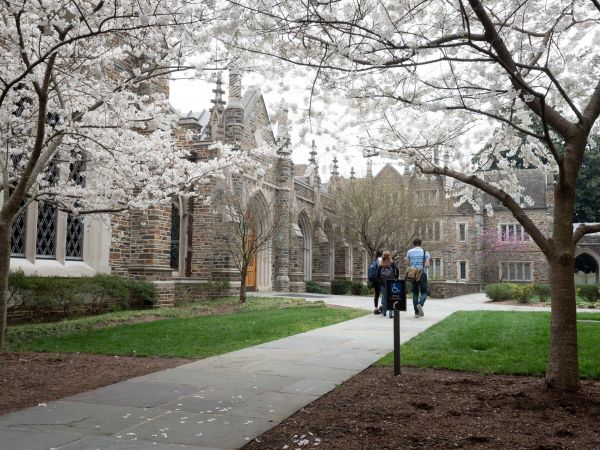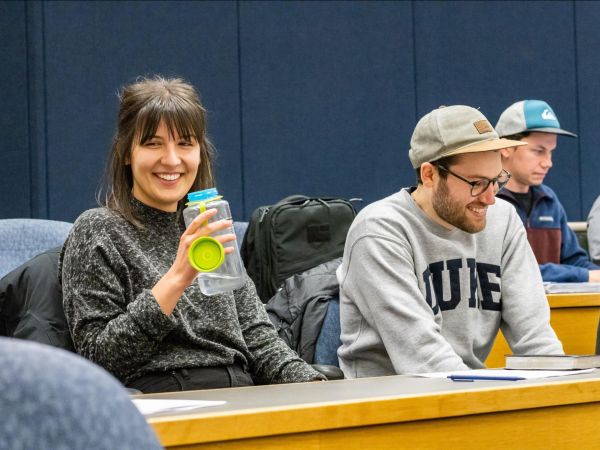Duke Divinity’s Doctor of Theology (Th.D.) program provides students with academically rigorous training informed by an understanding of theology as critical reflection on Christian practice and belief in the light of Holy Scripture.
Entering students work within theological disciplines such as Bible, church history, theology, ethics, homiletics, and Christian formation, and also at the intersection of these disciplines with fields such as political science, peacemaking and reconciliation, medicine, and the arts. The program is intentionally interdisciplinary, and students have access to the resources of both the wider university and partner institutions (including UNC-Chapel Hill, North Carolina Central University, and NC State University).
Like the Ph.D., the Th.D. at Duke is a rigorous research degree: the Ph.D. is awarded through and supported by the Graduate School of the university, while the Th.D. is awarded through and supported by the Divinity School. While many Divinity School faculty members are also members of the University’s Graduate Program in Religion (GPR), the Th.D. allows students to pursue their study under the direction of any regular-rank Divinity School faculty member—including those in disciplinary areas that fall outside the purview of the GPR, such as homiletics, evangelism, and Christian formation.
"My Th.D. was in New Testament, but in my current context teaching undergrads in a Jesuit university, I get to teach a wide variety of courses in Scripture, theology, and ethics. The Th.D. program was excellent preparation for this variety; it equipped me to think of myself as both a biblical scholar and a theologian."
Distinguished Faculty
At Duke Divinity School, you'll join the scholarly conversation with some of the top theological minds. Duke’s mentoring approach will give you access to faculty across disciplines and schools to enrich your academic project.


Interdisciplinary Scholarship
Our Th.D. students explore the intersection of theological disciplines with other fields, including political science, ecology, medicine, the arts, and peacemaking and reconciliation. Read about some of our recent students.
Curriculum
The curriculum for the Th.D. includes two academic years of full-time residency and completion of a dissertation that represents significant and original scholarly research.
The range and breadth of the Th.D. program is evident from a sampling of the dissertations completed. Recent graduates have investigated such topics as “The Censored Pulpit: Julian of Norwich as Preacher,” “Feeding and Forming: John Calvin, Materiality, and the Flourishing of the Liturgical Arts,” “Spiritualties of the Displaced: An Ethnographic Study of Homeless Lived Faith,” and “Lord, Teach Us How to Grieve: Jesus' Laments and Christian Hope.”
We designed the Th.D. program to deepen the ways in which we cultivate scholars, teachers, and pastors who embody the integrative theological task—ranging across the boundaries between the traditional academic disciplines of biblical, historical, systematic, and ministerial studies—to encourage and support theological reflection on matters of faith and practice in Christian communities.
Graduation Requirements
- Ordinarily at least two academic years of full-time (three courses per semester) residency; continuous registration in a “continuation” status from completion of coursework to completion of the dissertation
- Twelve courses: ordinarily at least six courses related to a primary concentration and at least three courses related to a secondary concentration
- The Th.D. core seminar, taken in the Fall semester of the first year, which may count as one of the primary or one of the secondary concentration courses
- Maintenance of a cumulative grade point average of 3.0; a student who falls below this level will likely be dismissed from the program
- Demonstrated competence in two modern languages other than English; additional proficiencies may be required in light of the student's particular research interests. Students whose work focuses on Scripture will also be required to demonstrate proficiency in Hebrew and Greek.
- Written preliminary examinations, including at least one in the primary area, one in the secondary area, and a dissertation exam
- An oral preliminary examination during which members of the student's examination committee ask the student to discuss the issues treated in the written examinations
- Completion and defense of an academic dissertation within four years of completing preliminary examinations

Each student admitted to the Th.D. program receives the same financial package, which includes tuition, fees, and a stipend for five years as well as funding for health insurance, language study, and conference presentations. Students typically serve as research assistants during their first year and as preceptors (teaching assistants) in subsequent years of residency. Applicants should complete a FAFSA to allow the Financial Aid Office to determine loan eligibility, if needed.
Lifelong Dividends
In addition to earning a degree from Duke Divinity School, you also receive benefits that continue to impact your life long after you leave. You will have access to the best academic resources in theological education and will use those tools throughout your career. By being able to fully participate in a top tier research university, your scholarship can create room for surprising and creative interdisciplinary connections. Th.D. students also have access to career and professional development resources while at Duke. The overwhelming majority of our students say their investment is worth it.
Ready for the Next Step?
Duke Divinity School accepts applications to the Th.D. program from September to December 15. For admission, applicants must have earned or be a candidate for earning a Master of Divinity (M.Div.), Master of Theological Studies (M.T.S.), or comparable master’s degree from an ATS-accredited school prior to the intended date of enrollment.
Request Info
Join our mailing list, and we'll send you more information.
Request Info about our programsVisit Campus
The best way to learn more about us is to visit. Schedule an in-person or online visit.
Visit Us
Learn More
For questions specifically about the Th.D. program, contact J. Warren Smith, professor of historical theology and director of the Th.D. program, at wsmith@div.duke.edu.





